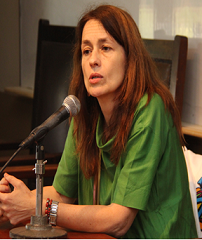The Right to Care in the Context of the Global Health Crisis (ES)
Laura Pautassi
 The COVID-19 pandemic has brought about a change of scenery in the field of human rights that must be addressed in all its dimensions. In Latin America the pandemic erupted in a moment when States were already challenged in their regulations and response capacity to COVID-19. Combined issues related to climate change, poverty, unemployment and the informal labour market, loss of quality and coverage of healthcare and education systems had exacerbated income inequality, alongside gender-based division of labour and care.
The COVID-19 pandemic has brought about a change of scenery in the field of human rights that must be addressed in all its dimensions. In Latin America the pandemic erupted in a moment when States were already challenged in their regulations and response capacity to COVID-19. Combined issues related to climate change, poverty, unemployment and the informal labour market, loss of quality and coverage of healthcare and education systems had exacerbated income inequality, alongside gender-based division of labour and care.
The recent measures adopted to prevent the pandemic first and foremost prescribe the restriction of movement and mandatory preventive social isolation. This brings to light the configuration of care within households and the unfair social organisation around it.
Care is usually understood as any activity that is essential in satisfying the basic needs for human existence and reproduction, providing the physical and symbolic elements that allow humans to live in society. These include self-care, the direct care of other people, providing the preconditions under which care is carried out (cleaning and food preparation among others) and care management (coordinating schedules, making transfers to educational centres, health or other institutions, etc.). Health care is usually understood as an activity that attends to the needs of those who are dependent due to their age or abilities (children, the elderly, the ill or people with disabilities) as well as those able to auto-provide this care. This intense work has historically been "naturalised" in women, which, with few exceptions to date, has not resulted in equitable household and societal distribution. In this way, families, the State, the market, and community-based organisations produce and distribute care unfairly, with the heavier burden lying on women's shoulders.
States guarantee certain benefits related to school and health infrastructure and implement reconciliation policies and measures between work and family life in the area of formal labour relations. However, these are insufficient when compared to the diverse and growing demands for care that exist. In the case of the market, it offers commodified responses based on disposable household income, and in situations of higher vulnerability, it is community-based organisations that provide some solutions, particularly in terms of childcare. In turn, the domestic environment has historically been a breeding ground for violence and gender inequality (both inter- and intra-generational).
What has been exposed up to now accounts for the central theme that has arisen from the pandemic: how do we address the unfair distribution of care work during the pandemic? For instance, let us think about what it means to move away from our workplaces into our homes under modalities such as remote working, how can the demands of several generations be abruptly reconciled with the permanent presence of all its members? How do we continue caring for dependent persons who do not live together in the same household?
Today more than ever, it is necessary to recognize that care, in addition to being intense work that should be valued, is a human right (the right to care, to be cared for and to self-care) that is incorporated into the corpus of human rights, which urgently needs to be implemented.
Recognizing and valuing care work requires universal and transversal policies, with regular budgets and a gender-focused basis. If not, we will come out of isolation and overcome the pandemic, but inequalities will be exacerbated. The opportunity that this crisis offers is unique. The tragic number of lives it has claimed is more than enough reason for us to advance with structural transformations. The proposals are available, it is a matter of adopting them at the governmental, business, social, and political levels, and particularly at the family and social levels.
Laura Pautassi has a PhD in Social Rights from the National University of Buenos Aires. She is currently the lead researcher at the National Scientific and Technical Research Council (CONICET) and at the Ambrosio Gioja Legal and Social Research Institute, School of Law (UBA). Director of the Interdisciplinary Working Group on Social Rights and Public Policies (www.dspp.com.ar), she was the independent expert and president of the Working Group for the Analysis of the United Nations Reports on the Protocol of San Salvador (OAS) from 2010 to 2018. She specialises in economic, social and cultural rights, gender perspective and public policy rights.

